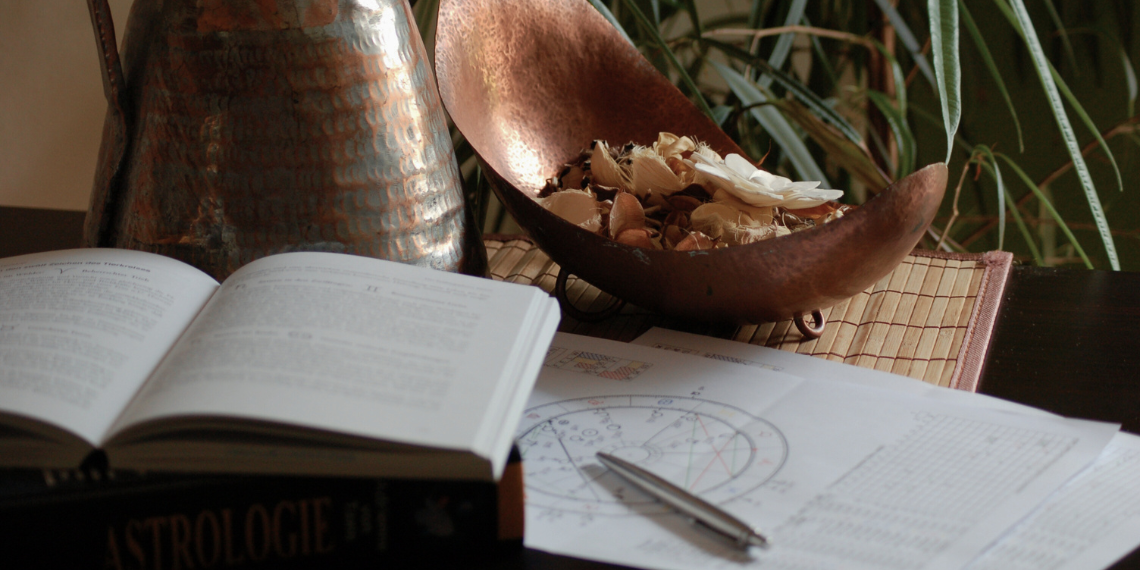
A Career in Astrology
Astrology is the ancient art of interpreting celestial influences—such as the positions of the Sun, Moon, planets, and zodiac signs—to understand personality traits, life paths, and future trends. Embracing both intuitive symbolism and technical knowledge of astrology, it offers insights into everything from relationships and personal growth to career and purpose[1].
As modern seekers increasingly pursue self-knowledge and holistic guidance, astrology is gaining popularity as a meaningful profession. Whether working with traditional sun-sign reports or offering in-depth natal chart readings, professional astrologers support clients in making sense of their lives and navigating key decisions[2]. Within this evolving field, skilled astrologers carve out niches, ranging from relationship guidance and vocational astrology to astrocartography and horary astrology. Being an astrologer is most likely a self-employed position and can fetch US$100-$200 per hour. Your earning capacity will depend on your ability to generate interest by appropriate marketing, your selected niche or geographical area, your comfort in providing services internationally online and how much of your week you would like to spend doing readings.
If you’re passionate about combining cosmic wisdom with practical insight, becoming an astrologer can be a deeply rewarding career, helping others align with their purpose while forging a path of personal transformation.

The Role of an Astrologer
An astrologer serves as a bridge between celestial patterns and personal insight, using natal charts to illuminate an individual’s life path, personality, strengths, and challenges. Here's an accurate breakdown of what the role entails:
- Creating and Interpreting Charts: Astrologers create and interpret natal charts—snapshots of planetary positions at the exact time and place of birth—to uncover key personality traits, talents, and areas of life focus. These insights help clients understand their inner motivations and align their life choices accordingly[3].
- Guiding Life’s Purpose and Career Path: Astrologers serve as cosmic career counsellors, using specific houses and planetary influences to highlight vocational strengths and timing for career moves. By aligning professional decisions with astrological cycles, clients can optimise success and fulfilment. This unique guidance fosters confidence in pursuing the right opportunities at the right moments[1].
- Personalised Counselling & Forecasting: A central skill of astrologers is their ability to provide tailored counselling. They synthesise technical chart data with intuitive insight to offer holistic advice, helping clients navigate relationships, health cycles, or life transitions. This blend of empirical analysis and empathetic guidance defines professional astrology[4].
-
Ethical Guidance and Client Empowerment: Trust is paramount in astrology. Reputable astrologers maintain strict ethical standards, ensuring confidentiality, transparency, and respect for client autonomy. They emphasise empowerment, helping clients make informed choices rather than dictating fixed outcomes. This professional integrity fosters long-term, transformative relationships built on trust and mutual respect.
The Lingo
Astrology comes with its own rich vocabulary, filled with terms that describe varying concepts. Understanding this lingo is essential for anyone stepping into the field, as it allows clearer communication and deeper insights into astrological readings. Here are some of the most commonly used terms every aspiring astrologer should know[5,6]:
- Ascendant (Rising Sign): This is the zodiac sign that was rising on the eastern horizon at the time of your birth. It influences your outward personality, physical appearance, and the way others perceive you.
- Natal Chart (Birth Chart): A personalised map of where the planets were located at the exact moment of your birth[7]. It includes planets, signs, houses, and aspects, serving as the core tool for astrological interpretation.
- Houses: The 12 houses divide the birth chart and represent different life areas, such as relationships (7th House), career (10th House), and home (4th House). The position of planets in these houses indicates where their influence will manifest.
- Retrograde: A period when a planet appears to move backwards in the sky. Retrogrades are often associated with delays, misunderstandings, or the need to reflect and revisit certain areas of life, especially during Mercury retrograde.
- Transit: Transits refer to the current movement of planets and how they interact with the positions in your natal chart. They are used to understand current influences and to predict future trends or challenges.

These key terms form the foundation for exploring astrology with clarity and confidence. As you deepen your studies, this shared language becomes an invaluable tool for offering accurate insights and guidance to others.
Training and Qualifications
While astrology is not a regulated profession in most countries, quality training is essential for anyone who wishes to practice ethically, skillfully, and professionally. Aspiring astrologers often begin by making a personal study of natal charts, planetary movements, and zodiac sign meanings, but a strong foundation also includes structured learning, mentorship, and practice.
Educational Pathways
There are several reputable institutions offering comprehensive astrology education. For instance, the International Academy of Astrology provides a range of courses suitable for complete beginners as well as those aiming to pursue astrology professionally. Their Diploma Program in Professional Training is specifically designed to equip aspiring astrologers with the in-depth knowledge and practical skills needed for a successful career in the field[8].
Kepler College provides a variety of certificate and diploma programs that cover core topics such as chart interpretation, forecasting, and astrological history. Courses are available both online and in person, making them accessible to students globally[9].
Similarly, Astrology University offers a four-tiered certification track, including foundational and advanced programs in natal, predictive, and relationship astrology. Their programs are designed to guide students from beginner to professional level, with an emphasis on mentorship and practical application[10].
In the UK, the Faculty of Astrological Studies is internationally respected for its rigorous diploma training. Their Level 1 course offers an in-depth introduction to astrological principles and prepares students for more advanced, professional study. The curriculum includes guided tutor feedback, assessments, and optional in-person summer schools[11].
Skills and Knowledge Acquired
Professional training generally includes chart construction and analysis, understanding planetary aspects, house systems, transits, progressions, and ethical consulting practices. Programs often emphasise both technical proficiency and the development of intuitive insight to support clients holistically[12].
Certification and Professional Recognition
Though not mandatory, certification lends credibility and helps build client trust. Graduates from institutions like Astrology University, Kepler College, or the Faculty of Astrological Studies may use their qualifications to join professional organisations, list on directories, or offer services through established platforms.
Whether self-taught or formally trained, continuous learning is vital. The evolving nature of astrological practice means that professional astrologers often engage in lifelong study, mentorship, and peer collaboration to refine their skills.

Skills and Qualities of a Successful Astrologer
Becoming an exceptional astrologer requires a blend of technical mastery, empathy, ethical grounding, and personal growth. These qualities ensure accurate readings, strong client relationships, and a thriving career. Here are a few traits of a successful Astrologer[13,14]:
- Deep Astrological Knowledge & Continuous Learning: Expert astrologers possess a strong foundation in planetary movements, zodiac signs, houses, and aspects—often gained through years of study and practical chart work. They constantly refine their knowledge by exploring advanced techniques like synastry, progressions, and electional astrology, and stay current with new research and software tools.
- Analytical & Critical Thinking Skills: Astrology is part science, part art. Professionals carefully analyse complex astrological configurations to form coherent interpretations. They verify insights using multiple techniques—such as chart rectification and predictive modelling—to ensure reliability.
- Intuition & Empathetic Insight: Beyond technical acumen, intuition infuses readings with nuanced understanding. Skilled astrologers are attuned to clients' emotional states, using empathy to craft guidance that is both insightful and compassionate.
- Clear, Sensitive Communication: Effective astrologers translate astrological complexity into relatable insights. Strong communicators explain chart findings with clarity, sensitivity, and non-judgment, fostering trust and deep understanding during readings.
- Ethical Integrity & Responsibility: Astrology impacts life decisions, making ethical conduct non-negotiable. Reputable astrologers maintain confidentiality, avoid fear-based predictions, and communicate astrology’s limitations. They demonstrate humility and prioritise their clients' well-being over sensationalism.
Final Thoughts
Pursuing a career in astrology is both a science and an art, rooted in ancient wisdom, yet constantly evolving with modern insight. Whether your interest lies in psychological astrology, predictive techniques, or soul-centred guidance, the path requires ongoing study, self-awareness, and ethical integrity. With dedication, astrology can become not just a career, but a deeply fulfilling way to support others on their life journey.
Step Into Practice with SoulAdvisor
If you're an aspiring or practising astrologer looking to connect with a wider wellness community, SoulAdvisor offers a supportive space to grow your practice. Our platform connects qualified practitioners with clients seeking trusted, heart-centred guidance. Join SoulAdvisor to showcase your services, share your wisdom, and become part of a global network committed to holistic wellbeing.
References
1. How Astrology Can Guide You to Your Ideal Career Path. Kapil Astrology Canada; [cited on 2025 Jul 4].
2. Astrologer. Career Jaano; [cited on 2025 Jul 4].
3. The Mystical World of Astrology: Exploring the Meaning and Role of an Astrologer. Astrojyotish; 2024.
4. What to Expect from the Best Astrologers: Key Qualities to Look For. Online Vastu Course's Blog; 2025.
5. Glossary of the Astrological terms (A-Z). Indastro; 2022.
6. Heroux D. A Guide to Common Astrological Terms. California Psychics; 2023.
7. Natal Chart. Co-Star; [cited on 2025 Jul 4].
8. Astrology: Department of Professional Training. International Academy of Astrology; [cited on 2025 Jul 4].
9. New Student Information. Kepler College; [cited on 2025 Jul 4].
10. Four-Year Program Professional Astrologer Training and Certification. Astrology University; [cited on 2025 Jul 4].
11. Diploma in astrology. Faculty of Astrological Studies; 2024.
12. Soni A. 10 Traits of an Expert Astrologer: What to Look for in a Professional. Astrologer Abhishek Soni; 2025.
13. What Makes an Astrologer Truly Great? Astro Prediction Anjan; 2025.
14. What is the Best Description for an Astrologer? Meaningful Moon; 2024.
Disclaimer: This Content has been developed from our generous global community and is intended for informational purposes only. This Content is not, nor is it intended to be, a substitute for professional medical advice, diagnosis, or treatment and should never be relied upon. Further, the personal views and experiences published are expressly those of the author, and do not represent the views or endorsement of SoulAdvisor through the act of publication on our site.










































